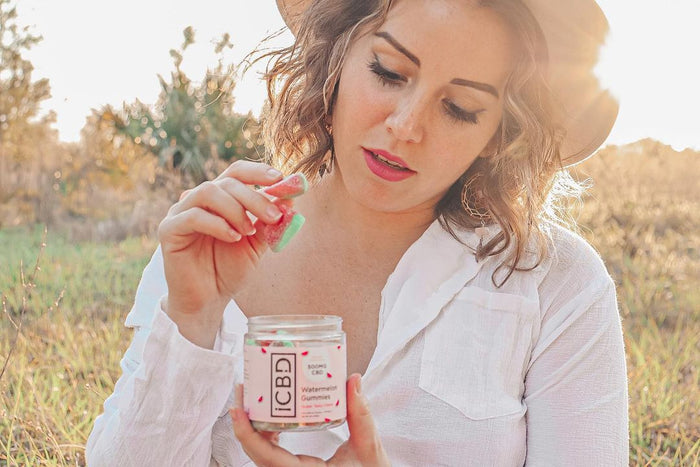CBD vs THC: How Do They Differ & Work Together

With the use of cannabinoid products gradually becoming more legal in the US, people are comparing two of the most popular compounds: CBD vs THC. While both can be beneficial, they each have their own properties and benefits that should be explored. Deciding on CBD vs THC can be an easy decision once you look at the facts and compounding differences between them.
CBD, also known as cannabidiol, is the non-psychoactive compound most commonly found in the flowers and leaves of the hemp plant. Its properties are similar to other antioxidants like chocolate, rosemary, and black pepper and help to promote health within your body. It can also be used to help relieve several different symptoms including:
- Anxiety
- Depression
- Nausea
- Seizures
- Pain and Inflammation
- Migraines
- Psychosis and other mental disorders
- Inflammatory Bowel Disease (IBS)
- And more
While it aids with many of these symptoms, there are also a few side effects such as appetite change, weight loss, and dizziness to name a few. Despite all of this, the benefits of CBD often outweigh the negative side effects.
Full-spectrum CBD legally can have less than 0.3% of THC present, and so is not recommended for those who need to get drug tested or have had adverse reactions to THC. Broad-spectrum CBD (like these 500mg Broad Spectrum Watermelon Gummies), on the other hand, is completely THC-free and perfectly fine for those who have to get tested or don’t wish to take THC at all. If you are looking to use CBD, iCBD has several unique products to help you achieve your best self!

THC, also known as tetrahydrocannabinol, is the psychoactive compound commonly found in marijuana. Low levels (less than 0.3%) of THC can also be found in the hemp plant. Like CBD, THC is also an antioxidant, although slightly less potent. Some of the symptom’s THC is used to treat can include:
- Pain
- Glaucoma
- Insomnia
- Muscle spasticity
- Nausea
- Anxiety
- Low appetite
- And more
While there are many similarities in the symptoms that both THC and CBD treat, the side effects of THC are more extreme. They can include:
- Increased heart rate
- Red eyes
- Dry mouth
- Coordination issues
- Slow reaction times
- Memory loss
- Worsened anxiety
- Memory loss
- And more
It is recommended that you talk to a doctor or other medical professional before taking THC medically to ensure there won’t be a reaction with any other medications. Though it is not fatal, THC use has been connected to long-term negative psychiatric effects in children.
What’s the Difference?
One of the most popular questions when looking at CBD vs THC is “What’s the difference?” In reality, there isn’t much of one. Both compounds have the same molecular structure, but different atom arrangements within, which causes slight differences. The cannabinoids both interact with the body’s endocannabinoid system, which is used to promote balance and homeostasis and connect to the brain’s neurotransmitters which control the body’s pain, immune system, stress, and sleep.
Although they come from the same Cannabis Sativa plants, the amount of CBD vs THC present differs based on the specific plant and its properties. Hemp, for example, is a plant with both CBD and THC, and it tends to have anywhere from 1-20% of CBD and often less than 0.3% of THC. Marijuana, on the other hand, has more than 0.3% of THC and produces the “high” psychoactive feeling most commonly associated with cannabis.

One of the main differences in CBD vs THC the way that the compound binds to the receptors in the brain. THC can bind with the cannabinoid 1 (CB1) receptor in the brain easily, creating a sense of euphoria, whereas CBD cannot and requires the inclusion of THC to do so.
There are also legal differences in CBD vs THC. As of January 2021, CBD is federally legal across the United States, but there are other laws that prohibit different uses in specific states. THC, on the other hand, is not federally legal in the United States. It is, however, legal in select states for either medicinal or recreational use. It is recommended to look up the legality of both CBD and THC in your states before purchase and use of either compound.
How Do They Work Together?
Although many people first think about CBD vs THC alone, the two compounds combined can create a better, heightened experience for the user. When used together, CBD helps to curb some of the more extreme side effects of THC, such as euphoria and sedation, which can be helpful for those taking it medicinally and not wishing for the “high” psychoactive effect.
The Entourage Effect is a theory that everything in the cannabis plant works together and produces a better effect than when taken alone. This theory suggests that the combination of CBD, THC, and cannabis terpenes (smaller organic compounds within the plant) will allow the compounds to play off of each other and combat some of their negative side effects. Research, though preliminary, also suggests that the combination can create new health benefits that aren’t present alone.
While CBD and THC can be taken together, there is no “magic ratio” of how much to take of each. Depending on your body type, exercise, eating habits, and reason for taking it you may need to take more of one compound or another to achieve the best results. It may be best to start with around 5 mg of THC and 5-15 mg of CBD, and then raise the amounts based on use and experience.
In the end, CBD and THC are great compounds together and apart. They each have different health benefits to help make your life go smoother!
